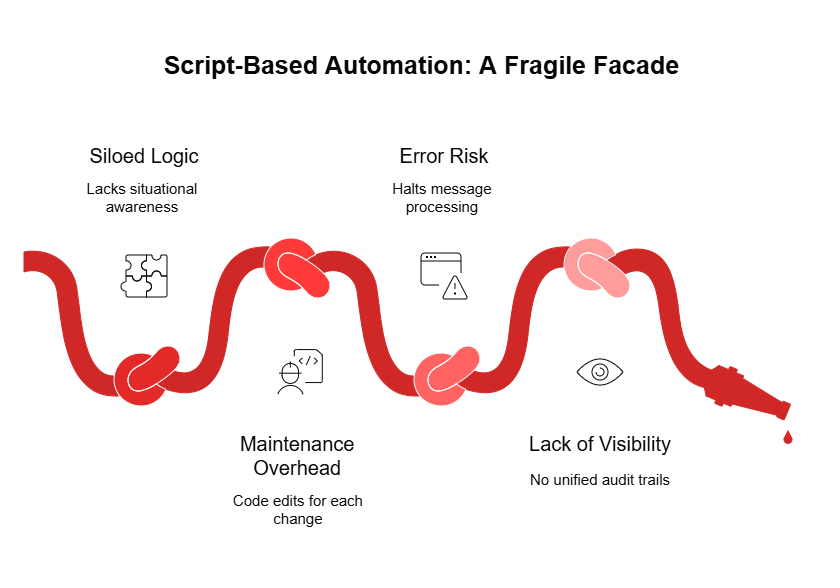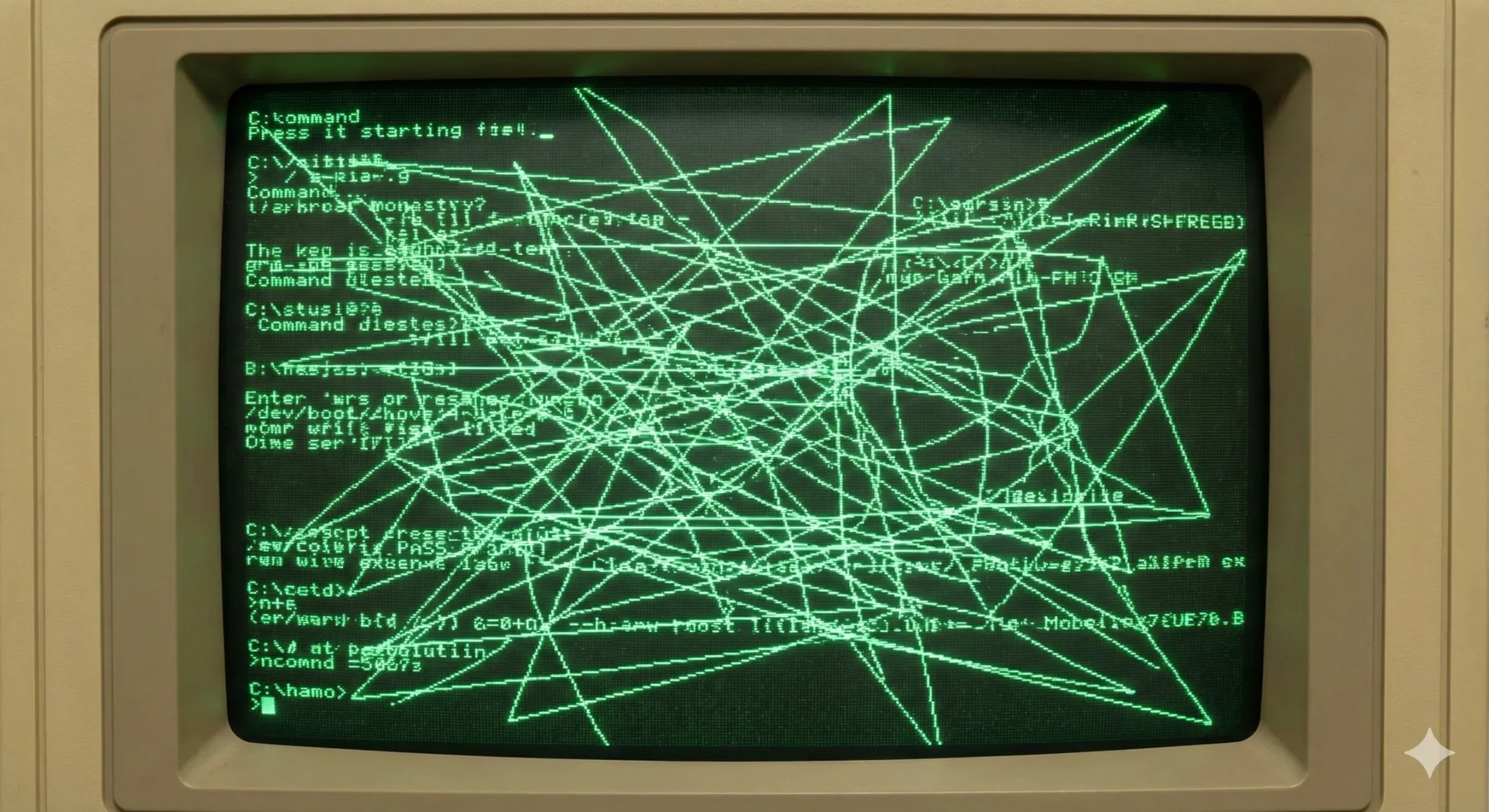- The Problem with Script-Based “Automation”
- Intelligent Automation: A New Approach to MQ Management
- How Infrared360 Makes MQ Automation Truly Intelligent
- Beyond Automation: Enabling Predictive Operations
- Why Scripts Can’t Compete
- The Payoff: Efficiency, Consistency, and Peace of Mind
- Conclusion: The Future of MQ Administration is Intelligent
- Take the MQ Automation Readiness Quiz
Smarter Than Scripts: How Intelligent Automation Transforms IBM MQ Administration
For decades, IBM MQ administrators have relied on scripts to automate routine tasks — from clearing queues and restarting channels to handling messages stuck in the Dead Letter Queue. These scripts were once the backbone of efficiency. But as MQ environments have grown more distributed, containerized, and integrated with enterprise IT systems, the limits of traditional scripting have become painfully clear.
There’s a smarter, safer, and far more scalable way to manage MQ operations — and it’s built on intelligent automation.
The Problem with Script-Based “Automation”

On the surface, scripts look like automation. But in reality, they’re fragile, hard to maintain, and only as good as the person who wrote them. In today’s complex MQ deployments, that fragility translates to risk.
Common pain points include:
- Siloed logic – Scripts handle specific issues but lack situational awareness across queue managers.
- Maintenance overhead – Each environment change requires code edits, testing, and version control.
- Error risk – A single syntax mistake or outdated condition can halt message processing.
- Lack of visibility – Scripts don’t generate unified audit trails, logs, or dashboards for compliance and operations.
What begins as a quick fix often becomes a brittle layer of complexity — one that slows teams down rather than freeing them up.
Intelligent Automation: A New Approach to MQ Management
Intelligent automation goes beyond scripts by combining rule-based logic with real-time monitoring, context awareness, and integration across systems. Instead of reacting to failures, it anticipates them. Instead of hardcoding responses, it applies flexible, policy-driven decisions.
Infrared360 brings this modern approach directly into IBM MQ environments — replacing manual scripts with automated, adaptive, and auditable workflows that align with operational goals.
How Infrared360 Makes MQ Automation Truly Intelligent
1. Policy-Based Control
Forget static scripts that only handle specific conditions. Infrared360 allows you to create dynamic automation policies that respond based on message type, destination, or failure cause.
Example:
If a queue depth exceeds a threshold and the destination is critical, Infrared360 can automatically reroute or pause message flow — without a line of code.
2. Continuous Monitoring and Self-Healing
Traditional scripts need to be scheduled or manually triggered. Infrared360 runs continuously, detecting issues in real time and automatically correcting them.
- Restart channels automatically when connectivity drops.
- Clear or reprocess messages based on intelligent rules.
- Notify the right team when a failure pattern is detected.
3. Context Awareness Across MQ Environments
Scripts usually operate in isolation, but Infrared360 understands context — which applications, queues, and servers are affected. This allows it to act intelligently, not blindly, ensuring automation decisions are safe and business-aware.
4. Integrated Visibility and Auditability
Every action Infrared360 takes is logged, visualized, and reportable. Operations teams can see exactly what was done, when, and why — satisfying both compliance requirements and cross-team accountability.
Beyond Automation: Enabling Predictive Operations
The true value of intelligent automation isn’t just faster problem resolution — it’s prevention.
Infrared360’s analytics detect early warning signs (like steadily increasing queue depths or repeated MQRC errors) and take corrective action before an outage occurs.
This predictive capability helps teams move from a firefighting model to a proactive operations model — where automation handles the noise, and people focus on optimization.
Why Scripts Can’t Compete
| Capability | Scripts | Infrared360 Intelligent Automation |
|---|---|---|
| Flexibility | Fixed logic | Dynamic, policy-driven |
| Maintenance | Manual updates | Centralized UI configuration |
| Visibility | None | Dashboards, alerts, and logs |
| Scalability | Limited | Multi-queue manager and multi-environment |
| Integration | None | Native ITSM and DevOps integration |
When viewed side by side, it’s clear: scripts were designed for static, isolated systems — not for the hybrid, containerized, multi-cloud MQ ecosystems of today.
The Payoff: Efficiency, Consistency, and Peace of Mind
By replacing fragile scripts with intelligent automation, MQ teams gain:
- Consistency – Every queue manager follows the same reliable rules.
- Faster recovery – Issues are resolved in seconds, not hours.
- Reduced operational cost – Less time maintaining scripts, more time optimizing performance.
- Confidence – Knowing that MQ environments are continuously monitored and self-correcting.
Conclusion: The Future of MQ Administration is Intelligent
Automation was once about reducing keystrokes — now, it’s about amplifying intelligence.
With Infrared360, IBM MQ administrators can finally move beyond the limits of scripting and embrace a smarter, safer, and more scalable future.
Instead of writing scripts to handle the next problem, imagine an automation platform that’s already preventing it.
Take the MQ Automation Readiness Quiz
Discover how mature your automation strategy really is — and see where Infrared360 can help you go from reactive scripting to intelligent, hands-off operations.
More Infrared360® Resources
























